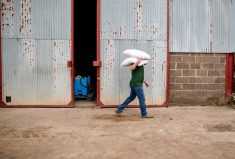Travel restrictions and mixed messaging had some Manitoban producers “freaking out” after it seemed temporary foreign workers might not be let into the country.
On March 16, Prime Minister Justin Trudeau announced that foreign nationals from all countries except the U.S. would be temporarily barred from entering Canada in response to the evolving threat of the COVID-19 virus.
Canada needs about 60,000 workers from Mexico and Caribbean nations for the agriculture sector, according to one report while seasonal paid workers make up 53 per cent of Canada’s paid agricultural work force according to the Canadian Horticultural Council.
Read Also

Canada’s import ban on Avix bird control system ruffles feathers
Canadian producers’ access to Bird Control Group’s Avix laser system remains blocked despite efficacy studies and certifications, as avian flu deaths rise.
Even after federal Public Safety Minister Bill Blair told reporters that temporary foreign workers (TFWs) and seasonal agricultural workers (SAWs) would be allowed into the country provided they observed a two-week quarantine, growers weren’t certain if this applied to workers other than from the United States.
Senator Rob Black later tweeted that he’d spoken to Agriculture Minister Marie-Claude Bibeau.
“She assured me that seasonal workers will be able to come work on Cnd farms despite border closures,” he wrote. “Her team is working hard on this issue.”
In Manitoba, Beth Connery, labor chair of the Canadian Horticultural Council, said she along with several other organizations, put together a document laying out the repercussions if TFWs were barred from entry, and giving suggestions on risk mitigation if workers were let into the country.
The group sent the document to the federal cabinet the evening of March 18 with hopes it would help the government make a decision on how to admit TFWs, but on the afternoon of March 19, Connery was still waiting for further direction.

“They [the federal government] keep reiterating they’ll do everything needed to keep Canadians safe,” Connery said. “We spend our lives producing safe food for Canadians… we want everyone to be safe and healthy and that just extends into this situation.”
Once it’s confirmed the workers will come, said Connery, transportation will be another factor. Many airlines have severely restricted flights. The group discussed chartering planes to fly in workers. Some farms have done this in peak seasons before, she said.
On the ground, workers will need to self-isolate for 14 days just like any other international travelers, Connery said. As farmers already provide these workers with housing, it “should be totally doable,” Connery said.
It’s not decided yet if TFWs could work, provided they stay on the farms. Connery said information they have suggests food isn’t a vector for COVID-19.
Connery, who employs TFWs herself, said some workers have reached out to say they’re ready to come. Many have travelled her Portage-area farm for many years to provide for their families. The workers have indicated they’re already in tune with safety messaging in their home countries and on board to follow protocol once they arrive.
Earlier in the week, Manitoba Beekeeper Association chair Mark Friesen told the Co-operator honey producers were “freaking out right now” as many of them would soon need their workers. Two weeks delay might be doable, he said. Four weeks would be too late.
Commodity groups from Saskatchewan, Quebec and Ontario released statements calling for the federal government to allow TFWs in.
“Ontario alone is expecting approximately 20,000 workers to arrive in Canada in coming weeks to assist with spring preparation and planting as well as work in our processing plants,” the Ontario Federation of Agriculture said March 18. “Without these key individuals the production year and local processing capacity could be lost.”
– with files from David Fraser
















